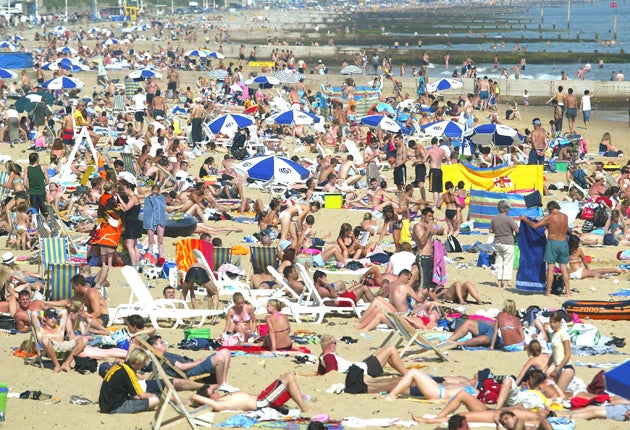You can stick your forecast where the sun don't shine
The Met Office has been hit by a storm with Britain's coastal resorts accusing it of pessimistic predictions which keep punters off the beaches

Weather forecasts rarely put David Cam in a sunny disposition. As a director of Blackpool Pleasure beach for the past 25 years he has, listened to countless forecasters try to predict when the heavens will open.
He knows that even the mere suggestion of a light squall is enough to persuade day-trippers to cancel any thought of heading to the seaside that day.
The problem, Mr Cam believes, is that the weather in coastal climates like Blackpool is often much brighter than a few miles inland but few broadcasters or meteorological websites bother to point out the difference.
"Inaccurate weather forecasts are an issue for us every day throughout our operating season," he says. "The British people often say they don't believe in weather forecasts but they trust them enough to rely on them as they plan their days out. If the forecast is wrong it can have an enormously detrimental knock-on effect on beach resorts like us."
Which is why Mr Cam was not in the least bit surprised when tourism chiefs in Bournemouth snapped at the Met Office earlier this week, calling their bank holiday forecasts "inaccurate... cautious and negative". Although the Met Office correctly predicted that last Saturday and Sunday would be perfect beach weather for the South Coast, they wrongly envisaged thundery showers for the bank holiday Monday.
Instead, Bournemouth's long sandy beach was bathed in sunshine and the mercury hit 2C, making it the hottest day of the year so far. Tourism chiefs believe Bournemouth missed out on 25,000 extra visitors who would have all spent an average of £41 for the day.
With a wealth of super-computers, satellite imagery and radar technology at the Met Office's disposal, predicting the weather is a more precise science than it once was.
But even the experts admit they occasionally get it wrong, particularly when it comes to sudden downpours and thunderstorms.
Byron Chalcraft began working as a forecaster at the Met Office in 1982: "When I joined it was the early days of super-computers but the information we get now is so much better. It's now very rare for the overall scenario to be anything other than what we predicted. But thundery showers and storms are so localised that it's often very difficult to tell exactly where they will break."
Residents of the Scottish Highland village of Carrbridge have become so incensed by inaccurate weather reports from the BBC that they have threatened to sue them. The tiny village of 700 relies heavily on the day-tripping tourist trade and is often sheltered from rain by the Cairngorm Mountains. Yet locals believe the forecasters all too often wrongly predict rain for the area.
Danny Fullerton runs the Landmark adventure park on the outskirts of the village. He believes the problems that operators have in the town are twofold: "Firstly the language that broadcasters use is overly negative. If a bit of rain is forecast they'll use 'light showers' rather than 'mainly dry' which is still accurate but is much more likely to encourage people to take a trip somewhere." Mr Fullerton, 50, also believes that the BBC's weather website – where you can enter a postcode to see what the weather will be like somewhere – makes the forecast look more accurate than it is.
"People never expected to get postcode accurate weather forecasts until providers like the BBC started offering it. But they are essentially promising information that isn't as accurate as it pretends to be."
Colin Dawson, the chief executive of the British Association of Leisure Parks, Piers and Attractions, believes broadcasters need to stop "talking down" the weather: "I appreciate the difficulties of truly accurate regional forecasts, particularly when we have so many little micro-climates, but among broadcasters there is a tendency to lean towards pessimism about the weather rather than optimism," he says.
"Broadcasters can't help themselves, they always seem to say things like 'Not a good day to head to the beach' or 'Where's it raining at the moment then'. It does huge damage to the tourist industry. Inform people where it's raining, but please don't forget to tell people where and when it's sunny."
A lot of hot air? How forecasts are made
* Weather forecasts are notoriously difficult in Britain because of its maritime position on a latitude that experiences wide fluctuations in wind speed and barometric pressure.
* Meteorologists make forecasts based on data on wind speed, barometric pressure, rainfall, temperature and cloud cover. They use super-computers to calculate how these changes are likely to affect future weather patterns.
* In the past, meteorologists made forecasts by collating data from instruments on ships and weather stations on land. Satellites have played an increasingly important role.
* Satellites can measure over a wider area of land and sea by monitoring clouds and weather fronts. They have proved invaluable in providing real-time weather snapshots. The improved power and speed of computers has really advanced forecasting. The latest super-computers the Met Office uses can make millions of calculations per second.
* As a result of better computers, the Met Office can model the weather at higher resolutions, down to an area of 1.5sqkm. This means it can make accurate predictions covering areas the size of a small town rather than the larger slices of the country commonly covered 20 or 30 years ago.
* Weather forecasts are reasonably accurate over a three- to five-day period but longer range forecasts covering several months are only educated guesses based on longer range phenomenon such as oscillations in ocean currents. Such forecasts are never very detailed and can only give a broad outline of what to expect.
Join our commenting forum
Join thought-provoking conversations, follow other Independent readers and see their replies
Comments
Bookmark popover
Removed from bookmarks